Many years ago now, in 2006 or 2007, I attended Darmstadt's Fereinkurse Fur Neu Musik. Given a scholarship to attend it was difficult to refuse the offer and I accepted without any clear idea why I was going there other than my label in Germany suggested I do it. All I knew of Darmstadt was that Stockhausen and Cage and Cardew taught there. Looking at the list of the faculty I was not familiar with anyone other than Rohan de Saram (who I'd heard perform with Arditti Quartet) and the composer Helmut Lachenmann whose works had interested me since it seemed he had strategies similiar to the electro-acoustic music I was hearing and playing myself in Berlin. I had not read anything written by him and all I had heard left me on the edge of the an incomprehensible sense of adventure in composing. Oddly, this influenced me to go entirely in the opposite direction of composing for other people but rather in expanding my listening capacities and following his lead in the search for compositional material in noise and apparent silence. In a sense, this is ancient history for me now. I seem to have gone far afield or to have abandoned entirely this realm of music even though the courage I feel in going on derives from no influence more obvious to me that his own person. When I showed him my "composition" at one lecture, which consisted of nothing more than a schematic diagram of my current set-up for prepared guitar, piezo boards, electronics, feedback systems, granular synthesis, he paused and said "you know, if you have developed your own system, no one else can tell you what to do or how to proceed". This simple remark would prove to be very inspiring on many levels not least of which was bring me to address the question myself whether or not I had indeed created my own system. I spent years refining down to the most rudimentary elements, refusing to use Abelton, writing my own PD patches and then cracking electronic boards and wiring things in the way that still results in my set-up time taking much longer than the average sound technician can stand.
In any case, I took to liking Lachenmann quickly because he turned out to be the most humorous and open-minded of all the people I had met there. A few lunch sessions were spent talking about the philosophy of Emmanuel Levinas, Paul Celan, Herbert Brun & others -- and Herr Lachenmann tilted his head at one moment, looked me in they eye and said, "I see you read books." For once in recent memory I felt at home and happy that I didn't have to hide the facts of my fetish. Other talks with George Aperghis who admired and encouraged my graphic scores and these exchanges with Lachenmann, whose lectures I attended in German, Italian and English remain with me unto this day and in the time being in Darmstadt (a great culture shock from my dwelling in Berlin), allowed me to wade through the week of cold, luke-warm and bristly contact with the younger representatives of the European new music elite. People from the USA helped as well since they were in no mood to merely sit through concerts and lectures and young composers presentations and they managed to get a local pub to permit us to stage noise and improvised music sets in the later evenings.
In keeping with the tradition I established, I have kept these notes un-edited. They are a direct transcription of what I heard that day. The title alone was added to my old website and I've sent it in emails and posted it in this way to several forums. I continue this tradition of transparency today even though I could not resist a few editorial interventions (in red)
Attempt at fragmentary recovery of main features of lecture OHNE TITEL given by Helmut Lachenmann and translated live by Wieland Hoban (an amazing feat in and of itself given the complexity of the ideas & that there was no transcript and Wieland seemed to be staring into the space in front of him like a Sybil or a medium transmitting messages from the ether) .
Structural note: the bullets are points he laid out and then went back over more sporadically. I was so taken by what he was saying that I didn't write each header down.)
(Lachenmann makes joke about west meets east as "west eats meat")
-- allusion to the presence of Ravi Shankar in Darmstadt, spoken of later --
1) parasitism of an exhausted (western) society
2)
3) experiments/open ears for…/difference…difficulties…
4) Nishida/Kyoto school of thought—interface with west
5) Necessity of the euro-centric concept of art (vessel for recovery of analytic diasporadic fragmentation)
6) Shared characteristics of cultures of music as (ritual) evocation of the numinous presence of communal well being
7)
8)
9) European consciousness of art and its relationship to rupture as constructive and intuitive intervention
10) Definition of this rupture with the breaking with/of the magic and precedent to the purification/delivery into (well-being)
11) All great works of art dominated through and through by spirit (structure as formalism is useless to attain to spirit…Nono: refusal to teach Lachenmann until he studied Renaissance art and learned spirit dominates great works main preoccupation)
12) euro-logo-centrism as related to progress and globalism as part of the parasitic and the search for exotic products of global culture—infection of globalism.
13) All one can do to change world is to consistently apply one’s own apparatus for enlightenment in order to renovate culture. This may seem like an intellectual process but in fact it is not and requires more than intellect to be carried out.
14) The misguided form of protest against parasitism in the supermarket of ideas—intellectual obsession, empty cultural critiques, world music, fun, tv, diversion and sport -- as all leading to conservatism of un-reflective culture
15) The attitude of the post-modern is to ask the audience “what do you want?” “how do you like it?” and this illuminates the situation of consumerism and entertainment culture that surrounds and conditions the reception of art and art production itself
Then he elaborates on the points jumping around.
Suspicion of the intercultural parasitism, search for exotic and “intact” culture as panacea rather than focus on renovating exhausted western culture and its own problems. Says in 1968 he used first Chinese gongs in piece—an angry audience interrupts the performance—we can only fight this reactionary feeling in the world by understanding our own positions as Western composers and how we overstep limitations. Says he later learned how offensive were the techniques he applied to the gongs—as if he were a barbarian to torture them in that way.
To the European he wants to say that something has come to disturb the peace of the concert hall and western culture must find its own way to create using its own means not to rely on appropriating forms from imaginary gods of an external unfallen culture. The secret magic of ogaku, gamelan, Indian music moves something very deeply in our souls which is more important than art itself but it also carries information and it oxidizes toward an aesthetic position in the West with new possibilities. In 1957 there was a concert at Darmstadt of Stockhausen, Nono, Adorno and the Ravi Shankar. Lachenmann was 21 years old. An analytical composer—scolded by Nono for not appreciating that spirit guides all great works of art—Lachenmann said he felt this music left him a guest at the borders of a paradise. Shankar was still then a foreign world, there were no records yet really of this world and Indian cultural contacts with Europe were vague. How could he return the next day to his laboratory of analytical, technoid (sic) procedures? He spent a very uneasy night thinking Shankar’s art seemed to threaten the very existence of music itself with a force immensely greater than music. But the next day, he found himself able to resume his analytical music and laboratory studies in a renewed form imbued with a vigorous utopian feeling, determined to erode and dissolve music itself and return to the basic material of sound.
The musical practice of all cultures is certainly an invocation of some kind of numinous irrational force coming together in a collectively magical ritual. Stravinsky: music or art is the union of that which is most close to us with that which is the most high.
He recounts hearing Goebbels on the radio and the horror in realizing that the Nazi were actually practicing some kind off black magic hypnotism.
Music functions and spreads its effects throughout the world. In every techno club, baroque concert, rock concert, schlager band and concert hall (although he feels he must very cautiously proceed when he says this) we can see that there is a kind of magical ritual involved that conceals a desire for unity. Nowhere have we been able to abstain from such magical rituals. At all price levels the magic becomes a commodity and form of control which the culture industry lives off of. He says he does not feel prepared to talk about the depth of this process but starts of the topic with a recognition that music has always seemed to be some kind of attempt to communicate with gods but that, at least in the western tradition of Christian religion colored by Greek philosophy, the first points of polyphony (as a kind of metaphor for the magical unity) are soon cast as structural elements wherein we enter the picture as human beings imbuing a substance with a form of enlightenment which is also threatened then by analysis, made separate from us and it is only through this alienation, this separation and loss of unity that there is then possible the return to grace through the medium of music presented as a god-feast (sic).
He seems to set up a dialectic dynamic: composition (as structural creation and criticism combined) is equated with the Fall. While the realization or incarnation again is the concert which signifies a kind of re-unification of elements scattered into bits inside the score.
Art then is a form of broken magic. The brokenness precedes the evocation. Negation as sublation of the function that promised us security in the performance is a kind of rupture that brings about a desire in us for sensuous and sometimes erotic feeling, a wounding to the heart and a kind of transgression that also implies a kind of conflict with culture and its taboos but the process of cultural creation must be re-examined and brought to the area which its enlightenment gains access to the potential communion in this magical event. The European virus even as it is practiced in art—transforming the world perniciously—can only be remedied through a thorough exploration and experimentation with all elements being questioned down to the basic aspect of sounds.
It might be that the only religion that is wise enough to assist in this process and it is with Zen that is recognizes its own limitations. There must come something is the situation of “worship” that threatens to destroy the worship, a breaking away, if there is to be any reunification at all.



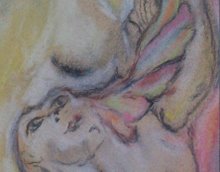


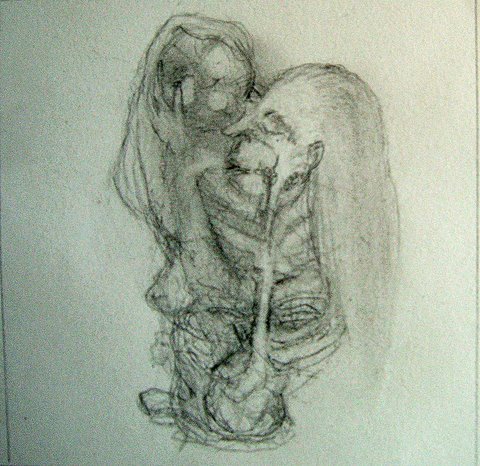
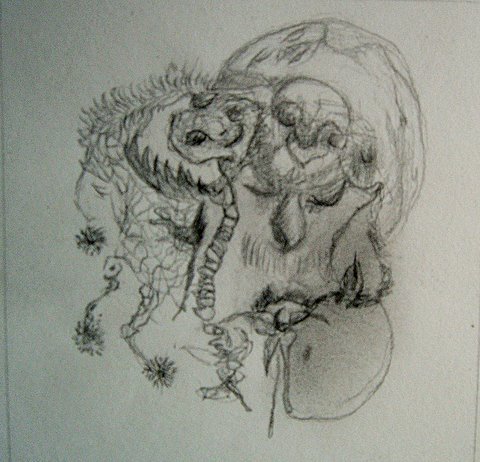
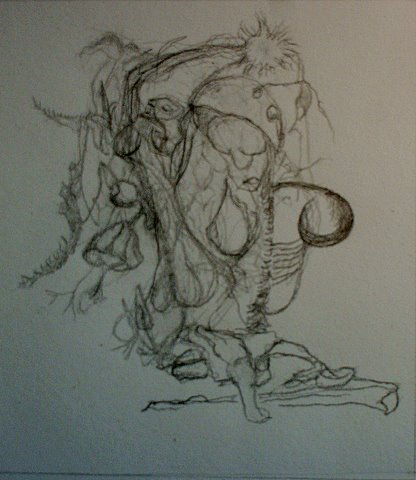
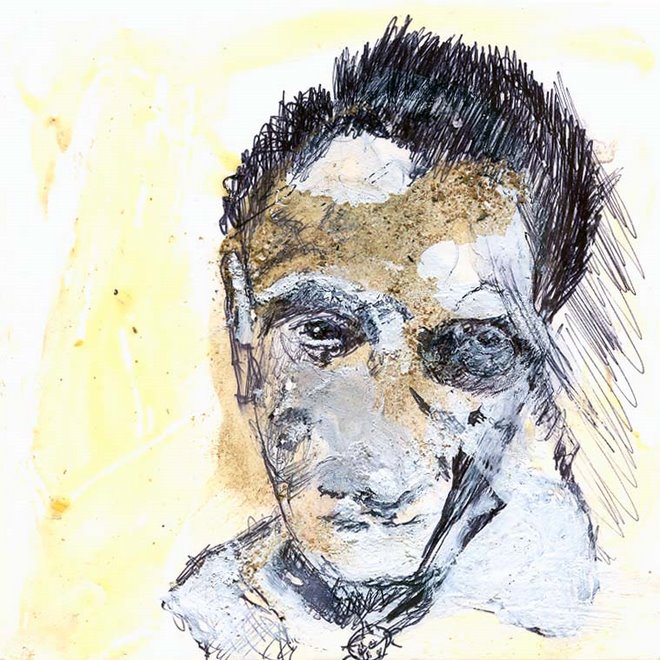
No comments:
Post a Comment